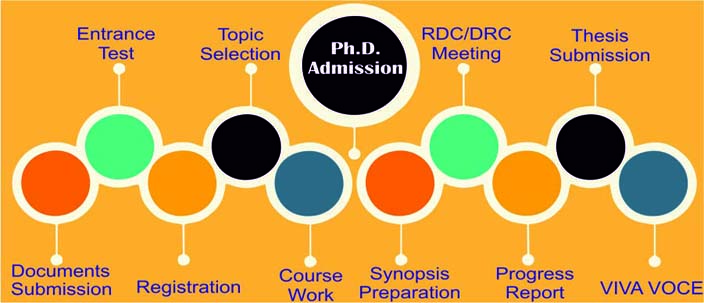Ph.D. ADMISSION

A PhD is a postgraduate doctoral degree, awarded to scholars who complete an original thesis providing a substantial new contribution to knowledge in their subject in a strict accordance with UGC rules, an apex body in India for regulating higher education. PhD qualifications are available in all subjects and are usually the highest level of academic degree a person can obtain. It takes a tremendous amount of time, inventiveness and dedication from each candidate, and the benefits of such hard work are wonderful. The PhD program prepares a person for a variety of respected careers in many fields such as an instructor, educator, researcher, or scientist. Requirements for obtaining a PhD degree are not very different in universities as they are governed by the standards established by the apex bodies under MHRD.


Rules can differ significantly from undergraduate degrees in research to higher doctorates. A person who has been able to successfully complete a philosophy doctorate is automatically given the academic title of "doctor". Although the students are typically referred to as doctoral students, scholars or PhD researchers when completing the program. However, after the student has completed all the course work and its exams, they are often referred to as doctoral researchers or PhD researchers working on their thesis.
A typical Ph.D. normally involves
Carrying out a literature review (a survey of current scholarship in your field).
Conducting original research and collecting your results.
Producing a thesis that presents your conclusions.
Writing up your thesis and submitting it as a dissertation.
Defending your thesis in an oral viva voce exam.



- Tie-up with best-in-class Universities for Ph. D. Admission
- Best for working professionals
- UGC, AIU, MHRD Approved Universities
- Admission Guaranteed
- Minimum University Visits
With Us, Ph.D. is Guaranteed

- Master's Degree with at least 55% marks in aggregate or its equivalent grade 'B' in the UGC 7-point scale.
- 5% relaxation to SC/ST/OBC candidates.
- In professional faculties like Ayurveda, Medicine, Law, Homeopathy etc. persons having Graduate Degree and having 10 years professional experience are eligible.
- The Entrance Examination will be conducted by the University at the national level on the pattern of UGC followed by interview.
- Those who are above 60 years may be enrolled on the basis of Graduation degree.
- Candidate has to discuss the area of Research interest with Research Coordinator at the time of Entrance Test.
Mode of Ph.D.
-
Regular Ph.D.
This is one of the most popular options for all doctoral programs. Candidates who apply for a regular PhD will work for his / her PhD degree full time. In addition, regular PhD candidates receive assistantship or fellowship from various institutes such as UGC / CSIR or any other recognised agencies.
-
Part Time Ph.D.
A part-time PhD in India is equally legitimate as full-time PhD programs, provided, it complies with the university awarding degree rules and regulations and the University Grant Commission.
After studying for several years and obtaining a Bachelors & Masters, spending three to five more years in academic studies and analysis is challenging for a student. Part-time Ph.D. program offered by several universities and colleges in India allows students who want to focus on something else while completing a Ph.D. in India. It simply means that an person in a part-time Ph.D. program can pursue a Ph.D. according to his / her comfort and speed.
A majority of people who choose to take up teaching as their occupation opt for a part-time doctoral program. They take classes as well as actively pursue their doctorate course.
You'll need to comply by all academic guidelines, and you'll need to submit thesis and other documents. The only difference is that during research, you won't have to spend the whole day at the university. -
Ph.D. Through Distance Mode
The UGC has issued a circular stating that the degrees granted through distance education for PhD programmes will no more be recognised. It said only full-time and part time programmes will be treated as degrees.
Ph.D. Admissions Disciplines
The admissions are carried out under various disciplines throughout various universities in India. The list of disciplines that are offered in India for Ph.D. has been given below
- Ph.D. (Accounting)
- Ph.D. (Agriculture)
- Ph.D. (Architecture & Planning)
- Ph.D. (Biochemistry)
- Ph.D. (Biotechnology)
- Ph.D. (Botany)
- Ph.D. (Business Administration)
- Ph.D. (Chemical Engineering)
- Ph.D. (History)
- Ph.D. (Hospital Administration)
- Ph.D. (Hospitality)
- Ph.D. (Hotel Management)
- Ph.D. (Humanities)
- Ph.D. (Information Technology)
- Ph.D. (International Relations)
- Ph.D. (Law)
- Ph.D. (Library Science)
- Ph.D. (Life Science)
- Ph.D. (Linguistics)
- Ph.D. (Marketing)
- Ph.D. (Mass Communication)
- Ph.D. (Chemistry)
- Ph.D. (Civil Engineering)
- Ph.D. (Commerce)
- Ph.D. (Computer Science)
- Ph.D. (Economics)
- Ph.D. (Education)
- Ph.D. (Electrical Engineering)
- Ph.D. (Mathematics)
- Ph.D. (Mechanical Engineering)
- Ph.D. (Medical Microbiology)
- Ph.D. (Microbiology)
- Ph.D. (Molecular Biology and Genetic Engineering)
- Ph.D. (Performing Arts-Music)
- Ph.D. (Pharmaceutical Chemistry)
- Ph.D. (Philosophy)
- Ph.D. (Physical Education)
- Ph.D. (Physics)
- Ph.D. (Physiology)
- Ph.D. (Physiotherapy)
- Ph.D. (Political Science)
- Ph.D. (Electronics & Communication Engineering)
- Ph.D. (English)
- Ph.D. (Entrepreneurship)
- Ph.D. (Environmental Science)
- Ph.D. (Finance)
- Ph.D. (Geography)
- Ph.D. (Hindi)
- Ph.D. (Psychology)
- Ph.D. (Public Administration)
- Ph.D. (Public Health)
- Ph.D. (Sanskrit)
- Ph.D. (Social Work)
- Ph.D. (Sociology)
- Ph.D. (Special Education)
- Ph.D. (Statistics)
- Ph.D. (Travel & Tourism)
- Ph.D. (Yoga & Naturopathy)
- Ph.D. (Zoology)
- Ph.D.(Management)
Flexi Course Work
01
Option One
On weekends for 1 semester
(August to November)
02
Option Two
Monthly for 4 days
(September to December)
03
Option Three
15 days continuously
(one time) (November/December)
-
Ph.D. Entrance Exam Pattern
Ph.D. entrance exam pattern consists of two parts.
- Part A - Research Aptitude (Research aptitude consists of sections of logical reasoning, numerical ability and language proficiency).
- Part B - Subject Specific (Subject specific contains technical questions in the subject).

